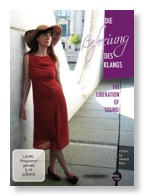Verena Rein
masterclasses
Booklet-Text on the film THE LIBERATION OF SOUND
-published by: miku media filmproduktion / Edition Peters 2010
Excerpt: „ (...) The film introduces the viewer to the tongue technique. Hearing this term, most vocalists automatically reject the very idea because they have learned that the tongue should of course be relaxed but fl at, that the tip of the tongue should always be touching the lower alveolar ridge and that the tongue immediately becomes rigid and stiff if they so much as think about how it actually moves in the mouth. Many books on classical vocal technique include all of these instructions, often presenting them as rules that are set in stone which cannot be changed, never challenging their validity.
However, vocalists who are allowed to sing with their tongue arched, moving it in a certain way will almost instantly feel a sense of physical and vocal liberation. The tongue can be used to direct the tones to their respective resonance spaces (free resonance). If this is prevented by keeping the tongue flat, the voice literally loses its direction and the only way to reach the specific resonance spaces is by increasing the air-flow pressure, stretching and straining the muscles, lowering the head, opening the mouth wide and so on. A singer who has learned how to use the tongue to direct the sound to the appropriate resonance spaces precisely will fi nd it easy to make a smooth transition between vocal registers, constantly discovering new resonance
points for the diff erent vowels in each register and, most importantly, realising that it is really possible to sing with a truly liberated voice. (...)“
Bel canto in art song - new ways of song interpretation
 - published by: nmz (Neue Musikzeitung), February 2006
- published by: nmz (Neue Musikzeitung), February 2006
The calls for more emotion in art song interpretation are continuously becoming louder. Poorly attended song recitals, bored listeners and annoyance due to identical ways of interpretation especially in German art song show the urgent need of new ways in song interpretation. This type of art, which has often been believed to be already dead or which has even been declared being dead, needs a rebirth very urgently.
read more...
Tongue technique in classical singing
For many a rather unusual or even negatively-laden idea - a taboo. Although the tongue technique is obligatory for articulation when playing wind instruments, it is not taught to singers as part of their training, beyond some minor hints concerned with the position of the tongue, in the education as a singer.
read more...
Zwei Welten stehen sich gegenüber (in German only)
Edwin Geist - Die Wiederentdeckung eines vergessenen Komponisten
 - erschienen in der nmz (Neue Musikzeitung)
- erschienen in der nmz (Neue Musikzeitung)
Ausgabe November 2007, auf der Internet-Plattform des DTKV Berlin und in der Dezember-Ausgabe 2007 der mr-Mitteilungen erweitert um biographische Angaben
Angefangen hatte alles mit dem Buch „Unerhörte Rettung – Die Suche nach Edwin Geist“ von Reinhard Kaiser, erschienen im Schöffling Verlag, 2004. In diesem Buch trug der Autor in akribischer Kleinarbeit alles zu der Zeit Mögliche zusammen, um das Leben des 1902 in Berlin geborenen und 1942 im litauischen Kaunas von den Nazis ermordeten Komponisten nachzuzeichnen. Die Geschichte Edwin Geists und besonders seine anrührende Liebe zu der litauischen Pianistin und seiner späteren zweiten Frau Lyda Bagriansky wurde dann auch von Presse und Radio viel beachtet, wegen ihrer Tragik bedauert und kommentiert, aber die Musik des Komponisten fand keine Beachtung.
read more...
Von der Kunst des Auftretens (in German only)
- Betrachtungen über ein sehr komplexes Phänomen
 - Kurzfassung erschienen in der nmz (Neue Musikzeitung)
Ausgabe April 2007
- veröffentlicht auf der Internetplattform des DTKV Berlin
(Deutscher Tonkünstlerverband)
- Kurzfassung erschienen in der nmz (Neue Musikzeitung)
Ausgabe April 2007
- veröffentlicht auf der Internetplattform des DTKV Berlin
(Deutscher Tonkünstlerverband)
Wie schaffe ich es, Hemmungen auf der Bühne abzubauen?
Wie kann es gelingen, meinen ganz persönlichen Ausdruck zu finden?
Wie kann ich authentisch mit meinem Publikum kommunizieren?
Diese und noch viel mehr Fragen den Auftritt betreffend haben wohl schon viele Musiker beschäftigt. Da übt man jahrelang, bringt es stimmlich oder auf seinem Instrument zu immer größerer Vervollkommnung, aber auf der Bühne will der Funke nicht so recht überspringen. Wie kommt es dazu?
read more...
Was ist Mozart-Gesang? (in German only)
- Rückblick, heutiges Ideal, kritische Betrachtung und Ausblick
 - erschienen in der nmz (Neue Musikzeitung), Ausgabe Juli/August 2006
- erschienen in der nmz (Neue Musikzeitung), Ausgabe Juli/August 2006
Beginnen wir die Ausführungen über ein Phänomen, welches in besonderem Maße der Mode im Wandel der Zeiten ausgesetzt ist, mit einem Zitat des Komponisten selbst:
„...die prima Dona singt gut, aber still, und wenn man sie nicht agiren sehte, sondern singen nur allein, so meinete man, sie sienge nicht, dan den mund kan sie nicht eröpfen, sonder winselt alles her, welches uns aber nichts neües ist, zu hören. la seconda Dona macht ein ansehen wie ein granadierer, und hat auch eine starcke stime, und siengt wahrhaftig nicht übel auf...“ (1)
An vielen Stellen des überlieferten Briefwechsels Mozarts finden sich solche oder ähnliche Sätze, die deutlich machen, dass der Komponist durchaus kein Freund zu intimen Gesangs war und auch die Expression und das Feuer (also die Dramatik) in der Darbietung immer wieder einforderte. Aber bevor wir uns Mozarts Vorstellungen genauer widmen, sei ein Blick in die heutige Zeit und in frühere Jahrzehnte erlaubt.
read more...
-published by: miku media filmproduktion / Edition Peters 2010
Excerpt: „ (...) The film introduces the viewer to the tongue technique. Hearing this term, most vocalists automatically reject the very idea because they have learned that the tongue should of course be relaxed but fl at, that the tip of the tongue should always be touching the lower alveolar ridge and that the tongue immediately becomes rigid and stiff if they so much as think about how it actually moves in the mouth. Many books on classical vocal technique include all of these instructions, often presenting them as rules that are set in stone which cannot be changed, never challenging their validity.
However, vocalists who are allowed to sing with their tongue arched, moving it in a certain way will almost instantly feel a sense of physical and vocal liberation. The tongue can be used to direct the tones to their respective resonance spaces (free resonance). If this is prevented by keeping the tongue flat, the voice literally loses its direction and the only way to reach the specific resonance spaces is by increasing the air-flow pressure, stretching and straining the muscles, lowering the head, opening the mouth wide and so on. A singer who has learned how to use the tongue to direct the sound to the appropriate resonance spaces precisely will fi nd it easy to make a smooth transition between vocal registers, constantly discovering new resonance
points for the diff erent vowels in each register and, most importantly, realising that it is really possible to sing with a truly liberated voice. (...)“
Bel canto in art song - new ways of song interpretation

The calls for more emotion in art song interpretation are continuously becoming louder. Poorly attended song recitals, bored listeners and annoyance due to identical ways of interpretation especially in German art song show the urgent need of new ways in song interpretation. This type of art, which has often been believed to be already dead or which has even been declared being dead, needs a rebirth very urgently.
read more...
Tongue technique in classical singing
For many a rather unusual or even negatively-laden idea - a taboo. Although the tongue technique is obligatory for articulation when playing wind instruments, it is not taught to singers as part of their training, beyond some minor hints concerned with the position of the tongue, in the education as a singer.
read more...
Zwei Welten stehen sich gegenüber (in German only)
Edwin Geist - Die Wiederentdeckung eines vergessenen Komponisten

Ausgabe November 2007, auf der Internet-Plattform des DTKV Berlin und in der Dezember-Ausgabe 2007 der mr-Mitteilungen erweitert um biographische Angaben
Angefangen hatte alles mit dem Buch „Unerhörte Rettung – Die Suche nach Edwin Geist“ von Reinhard Kaiser, erschienen im Schöffling Verlag, 2004. In diesem Buch trug der Autor in akribischer Kleinarbeit alles zu der Zeit Mögliche zusammen, um das Leben des 1902 in Berlin geborenen und 1942 im litauischen Kaunas von den Nazis ermordeten Komponisten nachzuzeichnen. Die Geschichte Edwin Geists und besonders seine anrührende Liebe zu der litauischen Pianistin und seiner späteren zweiten Frau Lyda Bagriansky wurde dann auch von Presse und Radio viel beachtet, wegen ihrer Tragik bedauert und kommentiert, aber die Musik des Komponisten fand keine Beachtung.
read more...
Von der Kunst des Auftretens (in German only)
- Betrachtungen über ein sehr komplexes Phänomen

Wie schaffe ich es, Hemmungen auf der Bühne abzubauen?
Wie kann es gelingen, meinen ganz persönlichen Ausdruck zu finden?
Wie kann ich authentisch mit meinem Publikum kommunizieren?
Diese und noch viel mehr Fragen den Auftritt betreffend haben wohl schon viele Musiker beschäftigt. Da übt man jahrelang, bringt es stimmlich oder auf seinem Instrument zu immer größerer Vervollkommnung, aber auf der Bühne will der Funke nicht so recht überspringen. Wie kommt es dazu?
read more...
Was ist Mozart-Gesang? (in German only)
- Rückblick, heutiges Ideal, kritische Betrachtung und Ausblick

Beginnen wir die Ausführungen über ein Phänomen, welches in besonderem Maße der Mode im Wandel der Zeiten ausgesetzt ist, mit einem Zitat des Komponisten selbst:
„...die prima Dona singt gut, aber still, und wenn man sie nicht agiren sehte, sondern singen nur allein, so meinete man, sie sienge nicht, dan den mund kan sie nicht eröpfen, sonder winselt alles her, welches uns aber nichts neües ist, zu hören. la seconda Dona macht ein ansehen wie ein granadierer, und hat auch eine starcke stime, und siengt wahrhaftig nicht übel auf...“ (1)
An vielen Stellen des überlieferten Briefwechsels Mozarts finden sich solche oder ähnliche Sätze, die deutlich machen, dass der Komponist durchaus kein Freund zu intimen Gesangs war und auch die Expression und das Feuer (also die Dramatik) in der Darbietung immer wieder einforderte. Aber bevor wir uns Mozarts Vorstellungen genauer widmen, sei ein Blick in die heutige Zeit und in frühere Jahrzehnte erlaubt.
read more...
